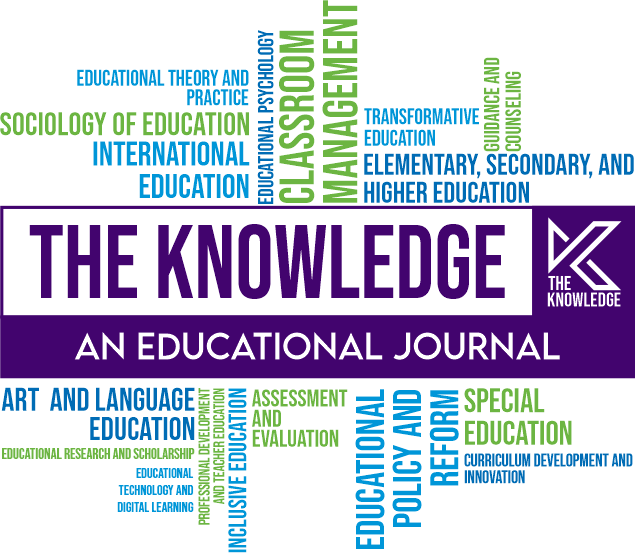Bridging the Gap: Exploring Professional Expectations of Novice Teachers from Veteran Secondary School Teachers
DOI:
https://doi.org/10.63062/tk/2k25a.31040Keywords:
Novice Teachers, Expectations of Novice Teachers, Veteran TeachersAbstract
This paper explores the professional expectations of novice teachers from veteran secondary school teachers and their effect on the workplace environment. The research methodology was based on the qualitative-interpretive approach. The participants were 10 novice teachers from different Government High Schools, and thematic analysis was conducted. The findings described a gap between novice teachers' expectations from veteran teachers and its effect on the workplace environment in case of a shortfall of expectations. The researchers recommend focusing on an individual guidance program for every novice teacher. This guidance program would be grounded on planning the teachers' abilities and requirements, structuring their professional development and promotion procedure. This should be made before their joining an educational institute, the veteran teachers and heads of the school may play an important role in this regard. Therefore, it is imperative to assist them in induction, proper and continuous guidance and mentoring are indispensable for these novice teachers to contribute to the school and students' development.
References
Ahmad, J., Ghaffar, A., & Zaman, A. (2022). Exploring the relationship of school collegiality and professional development of senior secondary school teachers of Khyber Pakhtunkhwa. International Research Journal of Management and Social Sciences, 3(2), 153-162. https://doi.org/10.53575/irjmss.v3.2.14(22)153-162
Bauer, T. N., Bodner, T., Erdogan, B., Truxillo, D. M., & Tucker, J. S. (2007). Newcomer adjustment during organizational socialization: A meta-analytic review of antecedents, outcomes, and methods. Journal of Applied Psychology, 92(3), 707-721. https://doi.org/10.1037/0021-9010.92.3.707
Braun, V., & Clarke, V. (2006). Using thematic analysis in psychology. Qualitative Research in Psychology, 3(2), 77-101. https://doi.org/10.1191/1478088706qp063oa
Bureau of Labor Statistics. (2005). https://www.bls.gov/opub/mlr/2005/
Fenwick, A. (2011). The first three years: Experiences of early career teachers. Teachers and Teaching, 17(3), 325-343. https://doi.org/10.1080/13540602.2011.554707
Floden, E. E., & Stanulis, R. N. (2009). Intensive tutoring as a way to help beginning teachers develop balanced instruction. Journal of Teacher Education, 60(2), 112-122. https://doi.org/10.1177/0022487108330553
Foghang, V. M., & Titanji, P. F. (2022). Interpersonal conflicts between teachers: Causes and effects in teacher training colleges, North West region, Cameroon. Journal of Education and Teaching Methods, 1(2), 18-31. https://doi.org/10.58425/jetm.v1i2.94
Friedman, I. A. (2016). Being a teacher: Altruistic and narcissistic expectations of pre-service teachers. Teachers and Teaching, 22(5), 625-648. https://doi.org/10.1080/13540602.2016.1158469
Gallagher, E. B., & Sias, P. M. (2009). The new employee as a source of uncertainty: Veteran employee information seeking about new hires. Western Journal of Communication, 73(1), 23-46. https://doi.org/10.1080/10570310802636326
Gilad, E., & Alkalay, A. (2014). The gap between role expectations of new teachers and school reality. International Journal of Education and Research, 2(12), 473-486. http://www.ijern.com/journal/2014/December-2014/40.pdf
Helmes, E., & Holden, R. R. (2003). The construct of social desirability: One or two dimensions? Personality and Individual Differences, 34(6), 1015-1023. https://doi.org/10.1016/s0191-8869(02)00086-7
Ingersoll, R. M., & Strong, M. (2011). The impact of induction and mentoring programs for beginning teachers. Review of Educational Research, 81(2), 201-233. https://doi.org/10.3102/0034654311403323
Jokisaari, M., & Nurmi, J. (2009). Change in newcomers' supervisor support and socialization outcomes after organizational entry. Academy of Management Journal, 52(3), 527-544. https://doi.org/10.5465/amj.2009.41330971
Khadka, B. B., & Bhattarai, P. C. (2021). Integrity triad as doubled edged sword for head-teachers’ integrity: A case from Nepal. International Journal for Educational Integrity, 17(1). https://doi.org/10.1007/s40979-021-00092-8
Lahad, K., Sabar, G., & Sabar Ben Yehoshua, N. (2017). Doing and displaying gendered boundary work among blended families in Israel. Sociology, 52(1), 95-110. https://doi.org/10.1177/0038038516677220
Menguc, B., Han, S., & Auh, S. (2007). A test of a model of new Salespeople’S socialization and adjustment in a collectivist culture. Journal of Personal Selling & Sales Management, 27(2), 149-167. https://doi.org/10.2753/pss0885-3134270203
Miller, D. J. (2006). Technological diversity, related diversification, and firm performance. Strategic Management Journal, 27(7), 601-619. https://doi.org/10.1002/smj.533
Mwamwenda, T. S. (2005). Job satisfaction in salary and promotion for secondary school teachers in Eastern Cape, South Africa. Journal of Psychology in Africa, 14(2), 147-150. https://doi.org/10.4314/jpa.v14i2.30623
Rollag, K., Parise, S., & Cross, R. (2005). Getting new hires up to speed quickly. MIT Sloan Management Review. https://sloanreview.mit.edu/article/getting-new-hires-up-to-speed-quickly/
Saks, A. M., Uggerslev, K. L., & Fassina, N. E. (2007). Socialization tactics and newcomer adjustment: A meta-analytic review and test of a model. Journal of Vocational Behavior, 70(3), 413-446. https://doi.org/10.1016/j.jvb.2006.12.004
Shimoni, S.,& Avidav-Unger, O. (Eds.) (2013). On the continuum: Education, practicum and professional development of teachers – policy, theory and practice. Tel Aviv: MOFET Institute and Ministry of Education.
Singh, N., & Krishnan, V. R. (2008). Self‐sacrifice and transformational leadership: Mediating role of altruism. Leadership & Organization Development Journal, 29(3), 261-274. https://doi.org/10.1108/01437730810861317
Thomas, L., & Beauchamp, C. (2011). Understanding new teachers’ professional identities through metaphor. Teaching and Teacher Education, 27(4), 762-769. https://doi.org/10.1016/j.tate.2010.12.007
Timor, T. (2011). The wheel of growth of pedagogical instruction. The International Journal of Learning: Annual Review, 18(1), 411-430. https://doi.org/10.18848/1447-9494/cgp/v18i01/47429
Downloads
Published
Issue
Section
License
Copyright (c) 2025 Copyright in the THE KNOWLEDGE is retained by the author(s). Authors also grant any third party the right to use the article freely as long as its integrity is maintained and its original authors, citation details and publisher are identified.
This work is licensed under a Creative Commons Attribution-NonCommercial 4.0 International License.







